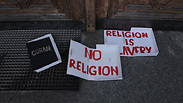
Atheists' state of affairs in Egypt is 'real tragedy'
Egyptian citizens who do not believe in God are considered heretics, hooligans, can be sentenced to prison at any time. Some attribute spread of atheism to radicalization of Islam
Atheists are considered in the eyes of society, religious clergy, and no less important, in the eyes of the authorities, as heretics and hooligans who can be sentenced to prison at any time.
Related stories:
- Egypt's al-Sisi wins TIME Person of Year poll
- New Egyptian constitution draft limits military power
- Muslim Sisterhood – Egypt's new pro-Morsi avant-garde
Ahmed Harakan, 20, said he didn’t become an atheist overnight, rather it was a process that was "months-long, even a year."
His family, unsurprisingly, didn't give him an easy time. "I expected there to be a problem with my parents, who are religious and made me learn the Quran by heart when I was a child. And indeed, I was right; there was a problem."
Ahmed and some of his atheist friends sit in Alexandria coffee houses and trade ideas on how to deal with their families' condemnations and the authorities' persecutions.
As for women who have become atheists, their belief is often more visible, as some wish to go unveiled. .
Sharif Jabar, a student in Suez University, was arrested in October and underwent investigation for 'religious contempt.' Last week, human rights organizations condemned the authorities for keeping Jabar in detainment.
It all started when Jabar argued with his professor on religious issues, and was forced to appear at a disciplinary hearing. His colleagues then signed a petition and gave it to the university's president saying he should be investigated for making a website that encouraged atheism. The investigation made its way to the police, prompting Jabar's arrest.
Nabila Abd a-Nabi, a director of one of the leading libraries in Egypt, said the "rise of Islamist politics (the Muslim Brotherhood) is the reason why the young generation developed an aversion for religion."
An Egyptian journalist told Ynet that the atheists' situation is a "real tragedy." Adding that though atheism is not a new phenomenon, "nowadays people are not hiding as much as they did in the past."
Clergyman Majdi A'asor also said that most atheists are a result of the radicalism. "The radicals don't recognize anything other than official interests, which are distancing people from religion. We are as disgusted with radicalism as we are with atheism."
After president Mohamed Morsi was overthrown, atheists tried to better their condition by calling on society to recognize their beliefs (or lack of beliefs), and even asked acting-President Adly Mansour to involve them in the making of the new Egyptian constitution. However, this initiative was not greeted with much enthusiasm.
Alia Elmahdy, a known Egyptian activist, shocked the world two years ago when she published on her blog pictures of herself naked in order to protest women's oppression in Egypt. The act brought waves of protest within the religious and Islamist factions, and it even reached death threats.
,
A few months ago she undressed again, this time in a protest against Morsi's Islamist constitution, and then just a few days ago published her own version of the muezzin's call to prayer. Instead of "God is great (Allahu akbar)," she wrote "Women are great," causing another rage.
- Receive Ynetnews updates directly to your desktop











